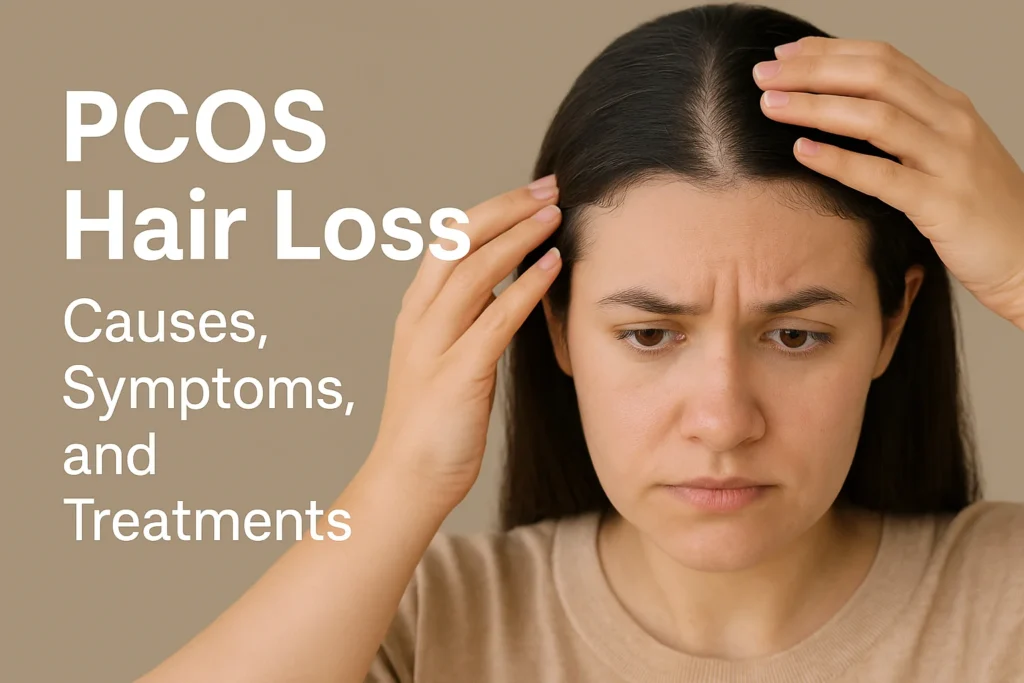If you’re a woman struggling with hair thinning, receding hair volume, or bald patches—and you also have Polycystic Ovary Syndrome (PCOS)—you might be wondering: Can PCOS cause hair loss? Sadly, the answer is yes. But here’s the good news—you can treat and reverse PCOS hair loss with the right approach.
PCOS hair loss is more common than most women realize. While PCOS is often associated with missed periods, acne, or weight gain, it can also mess with your hair in frustrating ways, causing it to thin out or fall more than usual.
In this guide, we’ll walk you through:
- How PCOS and hair loss are connected
- How to Recognize Hair Loss Caused by PCOS in Women
- Whether it’s reversible
- Powerful treatment options (medical and natural)
- And when you should seek professional help
It’s time to reclaim your healthy hair and feel like yourself again.
What Is PCOS and Why Does It Affect Hair?
Polycystic Ovary Syndrome (PCOS) is a hormonal disorder affecting nearly 10% of women of reproductive age. It causes the ovaries to produce excess androgens (male hormones like testosterone), leading to a chain of symptoms:
- Irregular or missed periods
- Cysts on the ovaries
- Infertility
- Weight gain
- Oily skin and acne
- Excess hair growth on face/body (hirsutism)
- Scalp hair thinning or hair loss
The last one—PCOS-related hair loss—can feel particularly painful, emotionally and socially. But to fight it, we first need to understand what’s causing it.
How PCOS Causes Hair Loss (Androgenic Alopecia Explained)
So, does PCOS cause hair loss? Yes, and it does so through something called androgenic alopecia, or female-pattern hair loss.

Here’s how it works:
- Your ovaries produce more androgens (like testosterone) than usual.
- These androgens are converted into DHT (dihydrotestosterone), a powerful hormone that attacks your hair follicles.
- With time, DHT weakens the hair follicles, leading to finer strands and faster shedding.
- Eventually, the follicles go dormant and stop producing visible hair altogether.
This process usually affects the crown, frontal scalp, and parting line, rather than the hairline (like in male-pattern baldness).
Common Symptoms of PCOS Hair Loss
Wondering if your hair loss is tied to PCOS? Here’s what to look for:
- Gradual thinning at the crown or top of the scalp
- Wider part lines or a visible scalp
- Excess shedding while brushing or washing
- Less hair volume—ponytails feel thinner
- Greasy scalp or scalp acne
- Increased facial or body hair despite scalp hair loss
If you notice any of these signs, there’s a good chance your hormones are to blame.
Is PCOS Hair Loss Reversible?
Yes—but it depends on early intervention, consistency, and a comprehensive approach. If the follicles are still alive (just inactive), there’s a very good chance you can regrow healthy hair.
However, results take time—usually 3 to 6 months of dedicated treatment. Stay consistent and patient—results don’t happen overnight, but they do come.
Medical Treatments for PCOS Hair Loss
A range of medical treatments is available to address PCOS and hair loss at the root. Here’s a breakdown of your options:

1. Minoxidil (Rogaine)
- FDA-approved topical treatment
- Stimulates hair follicles and increases blood flow
- Used 1–2 times daily for visible results in 4–6 months
2. Spironolactone
- A potent anti-androgen pill that blocks testosterone’s effects
- It works by minimizing hair fall on the scalp while also easing excess facial hair.
- Requires prescription and monitoring due to side effects (dizziness, low blood pressure)
3. Oral Contraceptives (Birth Control Pills)
- Regulate estrogen and progesterone to lower androgen levels
- Popular options: Yaz, Diane-35
- It can also help with acne and irregular cycles
4. Finasteride
- Inhibits DHT formation
- Typically used off-label in women; not safe during pregnancy
- Stronger effects than Spironolactone, but more side effects
5. Low-Level Laser Therapy (LLLT)
- Non-invasive light therapy to stimulate hair regrowth
- Works best when combined with other treatments
- Available in salons, clinics, or at-home devices
6. Corticosteroid Injections or Topical Creams
- For inflammation-driven hair loss (like alopecia areata, if co-existing)
- Helps reduce immune attack on hair follicles
Natural Ways to Treat PCOS Hair Loss
Medical solutions are helpful, but natural and lifestyle strategies are equally important, especially for long-term hormone balance and overall health.

Eat a Hormone-Balancing Diet
- Fuel your body with nutrient-dense vegetables, quality protein sources, and beneficial fats.
- Focus on anti-inflammatory foods like berries, olive oil, and fatty fish
- Avoid sugar, refined carbs, and dairy (can spike insulin and androgens)
Supplements That Support Hair Growth
- Biotin strengthens hair shafts
- Vitamin D3 – supports follicle function
- Zinc helps regulate hormones
- Inositol (Myo or D-Chiro) – improves insulin sensitivity, fertility
- Omega-3s – fight inflammation and support hair follicles
Tip: Test your nutrient levels first to avoid unnecessary supplementation.
Spearmint Tea
- A proven natural anti-androgen
- Drinking 1–2 cups daily has been shown to reduce testosterone in women with PCOS
Scalp Massage with Growth Oils
- Boost blood circulation and reduce stress
- Try rosemary, peppermint, pumpkin seed, or castor oil 3x per week
Stress Reduction
- Chronic stress increases cortisol, which worsens the hormonal imbalance
- Try adding calming activities like gentle yoga, breathing exercises, or a peaceful walk outdoors into your routine.
Hair Loss in PCOS: Comparison of Key Treatments
| Treatment Type | Examples | Best For | Side Effects |
| Medical | Minoxidil, Spironolactone, Pills | Moderate–Severe Hair Loss | Hormonal imbalance, mild irritation |
| Natural | Diet, Vitamins, Herbal Teas | Mild Hair Loss or Maintenance | Minimal to none |
| Tech-based | Laser therapy (LLLT) | Combo with meds or early loss | High cost, slow results |
| Lifestyle Changes | Stress, Sleep, Exercise | Overall PCOS health | None – all beneficial |
When Should You See a Specialist?
It’s time to consult a doctor if:
- Hair loss worsens despite natural remedies
- You notice bald patches or scalp visibility
- Hair fall is affecting your self-esteem or mental health
- Other symptoms like persistent acne, unwanted facial hair, irregular menstrual cycles, or unexplained weight gain.
- You’re planning a pregnancy and want to balance hormones safely
A dermatologist, endocrinologist, or OB-GYN can help you get a full diagnosis and treatment plan.
FAQs About PCOS Hair Loss
Does PCOS cause permanent hair loss?
Not always. If caught early, PCOS hair loss is often reversible. Waiting too long to address the issue can cause the hair follicles to shrink to a point where regrowth becomes extremely difficult.
Can I regrow hair naturally with PCOS?
Yes, especially when paired with dietary changes, scalp care, supplements, and reduced androgen levels. However, results take consistency and time.
Is PCOS hair loss worse during certain times?
Hair loss may fluctuate with stress, poor diet, weight changes, or hormone spikes, such as after stopping birth control or during postpartum periods.
Will cutting my hair help reduce hair fall?
Cutting hair doesn’t stop hormonal hair loss, but shorter styles can reduce tangling and breakage, making it feel fuller and healthier.
Final Thoughts: You’re Not Alone, and It Is Treatable
Hair loss in women with PCOS isn’t just about appearance—it affects self-image, confidence, and mental health. But remember: it’s not your fault, and you’re not alone.
With proper medical care, natural support, and self-kindness, many women successfully reverse PCOS hair loss and regain their healthy hair and self-esteem.
If you found this helpful, bookmark this article and share it with other women who may be struggling silently.
Need product recommendations or treatment routines? Stay tuned to LotusFemcare.com for science-backed, women-centered wellness advice.
You can also read: 11 Best Shampoos for Hair Loss in Women



